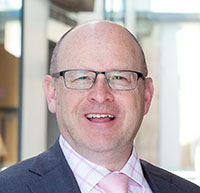
Steven Klein
Vice President of Business Development,
IRICoR
Getting new and promising therapies to cancer patients can take a long time. A Canadian Centre of Excellence is accelerating the process.
Montreal-based IRICoR is a Centre of Excellence for Commercialization and Research specializing in drug discovery and development. Its mandate is to identify promising research in cancer and related areas taking place at Canadian universities that has the potential to be translated into new therapies, and to accelerate the process of getting these novel therapies to patients.
“It would take a lot of time and expense for researchers to go through this entire process on their own,” says Steven Klein, Vice President of Business Development at IRICoR. “By de-risking these projects and then connecting them with private sector partners, like pharma and biotech companies or venture capital groups who have had success in commercializing research, we can move these projects from the lab to the clinical setting quicker, and get the benefits to the patients sooner.”
Immunotherapy holds promise for treating ovarian cancer
Drs. Claude Perreault and Pierre Thibault are two of the researchers affiliated with IRICoR. They have identified several shared tumour-specific antigens (TSAs) in ovarian cancer patients. “Their research suggests you could ultimately develop an off-the-shelf immunotherapy that targets only the cancer cells in the vast majority of these patients, rather than having to develop a specific treatment plan for each patient,” says Klein.
IRICoR has been funding the work of Drs. Perreault and Thibault since the researchers first proposed the concept of shared TSAs, including the proof of concept of this research in ovarian cancer and acute myeloid leukemia. “On that basis, we’re continuing to invest in Claude and Pierre’s work in other cancers where patient survival is a very big issue and the current standard of care leaves room for improvement,” says Klein. “At the end of the day, it’s about helping patients improve their quality of life in an oncology setting.”



